- Home
- Cervical cancer
- Managing side effects
- Bladder changes
Bladder changes
Bladder control may change after surgery or radiation therapy. You may find that you need to pass urine (wee) more often or in a hurry. Or you may leak a few drops of urine when you cough, sneeze, laugh, strain or lift. This is called urinary incontinence and there are ways to manage it.
Tips for managing urinary incontinence
- Strengthening your pelvic floor muscles needed to control urine can help manage urinary incontinence. Find out how to exercise your pelvic floor muscles.
- Using continence pads and special underwear can help you manage leakage. You may be eligible for help with the cost of these products. Visit Continence Aids Payment Scheme.
- See a continence nurse or physiotherapist. They can develop a bladder training program for you – ask your doctor for a referral, or contact the National Continence Helpline on 1800 33 00 66 or at Continence Foundation of Australia.
The blood vessels in the bowel and bladder can break more easily after radiation therapy. This can cause blood to appear in urine or faeces (poo), even months or years after treatment. Let your doctor know if this occurs so you can be given the appropriate treatment.
Podcast for people affected by cancer
Listen now
More resources
Prof Martin Oehler, Director of Gynaecological Oncology, Royal Adelaide Hospital, and Clinical Professor, University of Adelaide, SA; Dawn Bedwell, 13 11 20 Consultant, Cancer Council QLD; Gemma Busuttil, Radiation Therapist, Crown Princess Mary Cancer Centre, Westmead Hospital, NSW; Dr Antonia Jones, Gynaecological Oncologist, The Royal Women’s Hospital and Mercy Hospital for Women, VIC; Angela Keating, Senior Psychologist, Royal Hospital for Women, NSW; Anne Mellon, Clinical Nurse Consultant – Gynaecological Oncology, Hunter New England Centre for Gynaecological Cancer, NSW; Dr Inger Olesen, Medical Oncologist, Andrew Love Cancer Centre, Barwon Health, Geelong, VIC; Dr Serena Sia, Radiation Oncologist, Fiona Stanley Hospital and King Edward Memorial Hospital, WA; A/Prof Megan Smith, Co-lead, Cervical Cancer and HPV Stream, The Daffodil Centre, Cancer Council NSW and The University of Sydney, NSW; Emily Stevens, Gynaecology Oncology Nurse Coordinator, Southern Adelaide Local Health Network, Flinders Medical Centre, SA; Melissa Whalen, Consumer.
View the Cancer Council NSW editorial policy.
View all publications or call 13 11 20 for free printed copies.

